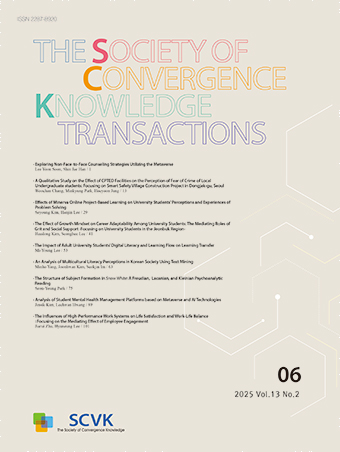Research Article
-
권오영, 김용순, "감정노동과 직무만족, 서비스 품질 및 직무성과 간의관계", 관광레저연구, 제27권, 제8호, pp. 123-136, 2015.
-
김경민, 임채관, "여성근로자의 감정노동이 직무만족과 삶의 만족에 미치는 영향", 아시아태평양융합연구교류논문지, 제10권, 제6호, pp. 38-62, 2024.
-
김정하, 김경희, "뷰티 서비스업 종사자의 감정노동, 회복탄력성, 심리적 웰빙이 직무열의에 미치는 영향", 韓服文化, 제23권, 제4호, pp. 5-19, 2020.
-
김태열, 이성내, "뷰티서비스업 구성원의 내부마케팅과 고객지향성의 관계에서 직무만족의 매개효과", 아시안뷰티화장품학술지, 제16권, 제4호, pp. 555-567, 2018.
-
박일순, "조직유효성에 미치는 감정노동의 효과 분석: 뷰티산업을 중심으로", 경영컨설팅연구, 제23권, 제2호, pp. 73-82, 2023.
-
손해경, "호텔기업 內部顧客의 情緖勞動 向上 戰略에 관한 연구", 한양대학교 대학원, 관광학과 박사학위논문, 2009.
-
신동주, 선우영수, "카지노종사원의 감정노동이 직무소진 및 조직유효성에 미치는 영향에 관한 연구", 관광연구저널, 제28권, 제8호, pp. 47-58, 2014.
-
안응자, "백화점 식당 종사원의 감정노동이 소진과 조직효율성에 미치는 영향", 외식산업경영연구, 제13권, 제2호, pp. 26-32, 2017.
-
윤여산, "고객불평행동과 직무스트레스가 직무만족에 미치는 영향연구", 경기대학교 대학원, 관광경영학과, pp. 169-218, 2021.
-
이정철, 이정욱, 조윤직, "경찰공무원의 감정노동이 감정소진과 조직유효성에 미치는 영향과 사회적 지원의 조절효과에 관한 연구", 한국사회와 행정연구, 제26권, 제2호, pp. 353-383, 2015.
-
이진수, "서비스 유형별 서비스품질 중요도에 관한 연구", 서비스경영학회지, 제7권, 제1호, pp. 3-23, 2006.
-
이중원, 김오성, 이기동, "서비스 직원의 직무 만족도가 서비스 품질에 미치는 영향", 고객만족경영연구, 제25권, 제2호, pp. 65-82, 2023.
-
이용재, 김장환, 박종희, "사회복지전담공무원의 감정노동이 서비스 질에 미치는 영향", 한국콘텐츠학회지, 제19권, 제6호, pp. 13-23, 2019.
-
이지만, 김레슬리, 이도화, "고객서비스몰입의 결정요인과 서비스품질 지각에 관한 연구", 한국인사조직학회지, pp. 437-456, 2004.
-
전선복, "헤어 미용사들의 감정노동이 직무소진과 이직의도에 미치는 영향", 한국엔터테인먼트산업학회논문지, 제13권, 제8호, pp. 13-24, 2019.
-
정지영, "환대산업 종사자의 서비스교육훈련, 직무만족, 감정노동 및 고객지향성의 관계연구", 觀光硏究, 제33권, 제8호, pp. 123-142, 2018.
-
조철호, 최석봉, "요양병원 간호사의 감정노동과 간호서비스품질간의 관계", 인적자원개발연구, 제20권, 제3호, pp. 34-72, 2017.
-
지정훈, "헤어샵 경영자의 감정노동이 회복탄력성 및 직무만족에 미치는 영향", 한국디자인문화학회지, 제28권, 제4호, pp. 435-445, 2022.
-
최정순, "호텔기업의 내부마케팅이 종사원의 감정노동과 서비스 제공수준에 미치는 영향", 동아대학교 관광경영학과 박사학위논문, 2003.
-
B. E. Ashforth, R. H. Humphrey, "Emotional labor in service roles: The influence of identity", Academy of management review, Vol. 18, No. 1, pp. 88-115, 1993.
-
C. Gronroos, "Service management and Marketing: Marketing Moments of the Truth in Service Competition", MA: Lexington Books, 1990.
-
A. R. Hochschild, "Emotion work, feeling rules, and social structure", American Journal of Sociology, Vol. 85, No. 3, pp. 551-575, 1979.
-
A. R. Hochschild, "The managed heart, Berkeley", University of California Press, 1983.
-
P. Kotler, "Marketing management strategy: A reader third edition, Full text available marketing news", Vol. 18, Issue 15, p. 21, 1984.
-
E. J. McCormick, J. Tiffin, "Industrial Psychogy. 6th ed", HJ: Prentice Hall, 1974.
-
Morris & Feldman, "The dimensions, antecedent, and consequences of emotional labor, Academy of Management", Review, Vol. 21, No. 4, pp. 986-1010, 1996.
-
J. C. Nunally, I. H. Bernstein, "Psychometric theory", 1978.
-
A. Parasuraman, V. A. Zeithaml, L. L. Berry, "Problems and StrategiesinServiceMarketing", Journal of Marketing, Vol. 49, pp. 34-35, 1985.
-
A. Rafaeli, "When cashiers meet customers : A analysis of the role of supermarket cashier", Academy of Management Journal, Vol. 32, pp. 245-273, 1989.
-
V. A. Zeithaml, M. J. Bitner, D. D. Gremler, A. Pandit, "Services marketing: Integrating customer focus across the firm(7th ed.)", Dubuque: McGraw-Hill Education, 2017.
- Publisher :The Society of Convergence Knowledge
- Publisher(Ko) :융복합지식학회
- Journal Title :The Society of Convergence Knowledge Transactions
- Journal Title(Ko) :융복합지식학회논문지
- Volume : 13
- No :1
- Pages :35-44
- DOI :https://doi.org/10.22716/sckt.2025.13.1.004




 The Society of Convergence Knowledge Transactions
The Society of Convergence Knowledge Transactions







